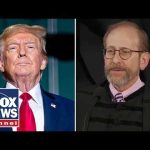In a much-anticipated news conference, President Trump and tech mogul Elon Musk are set to announce the end of Musk’s brief tenure as a government employee. This marks a significant turn in the ongoing saga of government involvement in tech, as Musk has expressed profound frustration with the bureaucratic challenges he faced while attempting to enact change in Washington. The stage is set for a lively discussion, highlighting both men’s desires to eliminate government waste and streamline operations—a mission that seems to have hit several roadblocks along the way.
Over the past year, Musk’s reputation has taken quite the rollercoaster ride. While he has been lauded for his remarkable successes with Tesla and SpaceX, the time spent in the government has resulted in a dip in his approval ratings—now sitting at 48%, with disapproval creeping in at 52%. Musk allegedly went into government work with noble intentions: to assist in modernizing and improving inefficient bureaucratic practices. But, despite his all-in approach, the endeavor proved to be more complex and challenging than he initially imagined. Indeed, he has already indicated that the federal bureaucracy is in worse shape than he anticipated.
The tension between Musk’s high-powered business mindset and the slow-moving gears of government has become evident. During his time in Washington, he felt stifled by the existing structures that prevent quick decision-making and innovation. It seems that while he could make radical changes at Tesla and SpaceX—like tweaking engines or redesigning products—he learned the hard way that government is a different beast altogether: a sprawling entity laden with red tape and interests that often resist necessary cuts and changes.
In the interviews leading up to the conference, Musk revealed his genuine frustration with both sides of the aisle regarding their reluctance to engage in serious budget cuts or reforms. He seems to believe that Washington has become captive to ingrained interests that prioritize their agendas over the needs of the American people. This has led to his increasing anger, not just at the system but also at the implications of this stagnation for innovation. Though his foray into government was undertaken with the hope of making a difference, Musk now seems ready to focus his energies back on his companies, which he feels are crucial to driving American productivity.
Looking toward a future without government duties, Musk has exciting plans on the horizon. He is keen on breaking new ground in technology, including advancements in self-driving cars and brain-computer interfaces through Neuralink. Some even speculate he might be on the brink of becoming the first trillionaire, given the strides his companies could make. However, the crucial question remains: Will he stay out of politics and concentrate on business, or will the allure of influence in D.C. draw him back in? Without a doubt, many supporters—including those in the Republican Party—hope he chooses the former, enabling him to innovate for the betterment of all Americans.
In summary, the impending news conference between Trump and Musk is not simply a farewell to a government role; it’s a harbinger of larger battles regarding innovation, bureaucracy, and fiscal responsibility. With both men aiming to transform how government operates and interacts with the business world, the direction they choose to take will undoubtedly have an impact on American innovation and productivity for years to come. And, as always, the American public will be keenly watching how this story unfolds.




